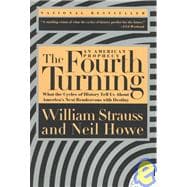
Note: Supplemental materials are not guaranteed with Rental or Used book purchases.
Purchase Benefits
What is included with this book?
| Winter Comes Again | p. 1 |
| Seasons | |
| Seasons of Time | p. 25 |
| Seasons of Life | p. 53 |
| Cycles of History | p. 91 |
| Overview: Seven Cycles of Generations and Turnings | p. 123 |
| Gray Champions | p. 139 |
| Turnings | |
| The First Turning: American High (1946-1964) | p. 145 |
| The Second Turning: Consciousness Revolution (1964-1984) | p. 171 |
| The Third Turning: Culture Wars (1984-2005?) | p. 201 |
| Fourth Turnings in History | p. 254 |
| A Fourth Turning Prophecy | p. 272 |
| Preparations | |
| Preparing for the Fourth Turning | p. 305 |
| The Eternal Return | p. 329 |
| Acknowledgments | p. 337 |
| Notes | p. 341 |
| Index of Names | p. 367 |
| Table of Contents provided by Blackwell. All Rights Reserved. |
The New copy of this book will include any supplemental materials advertised. Please check the title of the book to determine if it should include any access cards, study guides, lab manuals, CDs, etc.
The Used, Rental and eBook copies of this book are not guaranteed to include any supplemental materials. Typically, only the book itself is included. This is true even if the title states it includes any access cards, study guides, lab manuals, CDs, etc.
Excerpted from The Fourth Turning by William Strauss, Neil Howe
All rights reserved by the original copyright owners. Excerpts are provided for display purposes only and may not be reproduced, reprinted or distributed without the written permission of the publisher.